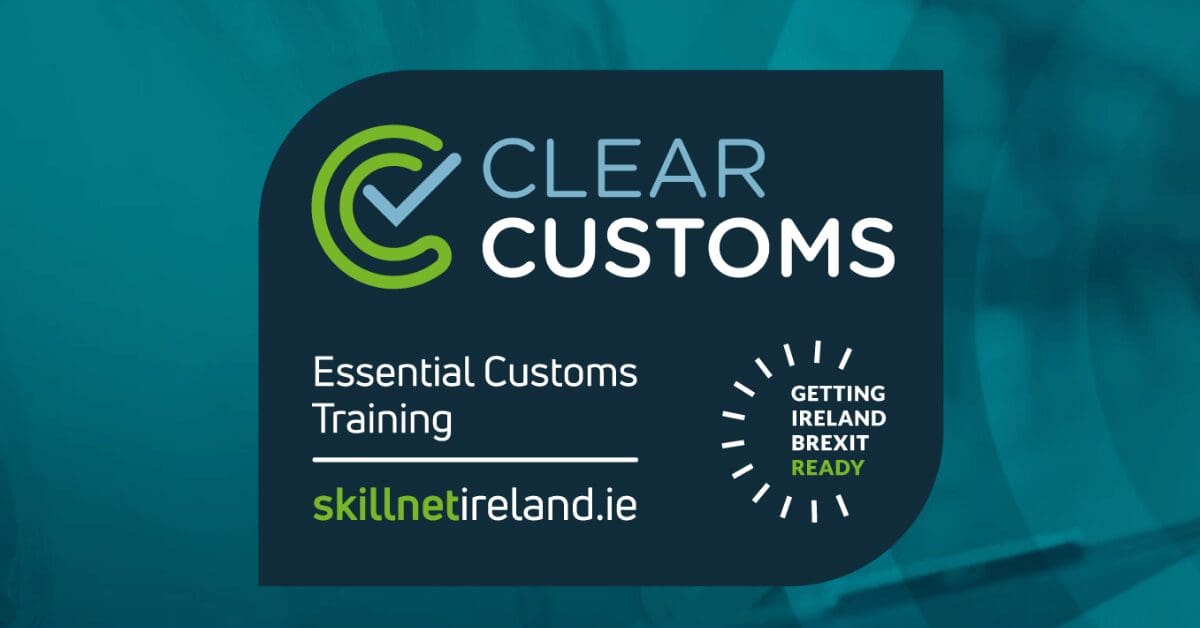BREXIT
Skillnet Ireland – Clear Customs Training

The Irish Government, partnered with Skillnet Ireland and other industry have launched Clear Customs – Essential Customs Training to support Irish businesses trading with or through the UK in preparing for new customs formalities arising from Brexit. Clear Customs offers eligible customs agents, customs intermediaries and affected businesses a free training programme to build capacity in the customs sector. Find out more here.
By the end of 2020, businesses, trading either with or through Great Britain, will be subject to a range of new customs formalities and other regulatory requirements. It is estimated that the number of customs declarations required will increase, from 1.6m annually at present, to an estimated 20m after the UK’s departure from the Customs Unions and Single Market. These changes will happen regardless of the outcome of the ongoing negotiations and businesses will find it increasingly challenging, without the necessary arrangements in place or required skills in-house, to deal with these additional responsibilities. Taking steps now to train your key staff on how to effectively complete a customs declaration helps pre-empt Brexit related customs challenges. Read more about Skilnet Ireland’s Clear Customs online training platform to prepare businesses for customs changes post-Brexit here
Ready for Customs – Grant from Enterprise Ireland
This new grant provides companies with financial assistance to cover the costs of taking on much needed additional customs clearance staff, which will be required when Brexit becomes a reality on the 1st January 2021. Find out more here
ISME Members who can assist with the customs process are:
Economic Operators Registration and Identification (EORI)
- If you are a trader who imports or exports goods into or out of the European Union (EU), you will need a unique EORI number. This number is valid throughout the EU. It is used as a common reference number for interactions with the customs authorities in any Member State. A short eLearning tool for EORI is available to download from the European Commission website. You will find further information about how to register for EORI and you can access the EORI system in the Revenue’s online services section.
- You may have had your EORI number aligned to your existing Value Added Tax (VAT) number. This was generally done for economic operators that held a customs and excise registration when EORI was introduced in 2009. You can check if you were automatically registered for EORI by accessing the Economic Operator Identification and Registration system. You should insert your existing VAT number prefixed by “IE” under “Validate EORI numbers”.
- If you need further information, Revenue operates a helpline for queries on EORI.
InterTradeIreland
- A dedicated hub for all things BREXIT – here
- How would EU tariffs affect your business? Go to
InterTradeIreland’s information on tariffs and commodity codes
ISME’s Brexit Q&A
This webinar took place in January 2021 and hosted by Adam Weatherley, ISME Learning & Development Manager. The panelists included:
- Neil McDonnell, ISME CEO
- Derek Dunne, Customs Compliance Manager, Quality Freight Group
- Paul McMahon, McMahon Legal & author ‘Brexit (An Irish Guide)’
- Ray Ryan, Assistant Principal in Customs Division, Revenue
Watch the Q&A below.
Post-Brexit procedures, controls, handling, and traffic flows in/to Belgian seaports
Belgium is an important logistic hub in Europe providing freight handling and shipping services for businesses in various European countries. Belgian authorities and ports are well accustomed to handling requirements and procedures for freight to and from countries outside of the EU. They have been preparing for the new situation with regard to the United Kingdom.
In order to best prepare for these new procedures, controls, and traffic flows, and thus ensure a smooth flow of goods to and from the UK via Belgian ports, companies exporting, importing and transporting freight to and from the UK can find an overview of webpages with relevant information hereafter:
New procedures and controls for transport from and to the UK
-
- Belgian Customs: Brexit website | helpdesk
- Belgian Agency for Sanitary & Phytosanitary controls: Brexit website | helpdesk
Handling sequence of traffic flows undergoing the procedures at the Belgian seaports and the use of port community ICT-systems in this context
-
-
- Port of Zeebrugge: Brexit website | helpdesk
- Port of Antwerp: Brexit website | helpdesk
- Port of Ghent / North Sea Port: Brexit website | helpdesk
-
Real Time traffic information
-
-
-
- Flemish Agency for Roads and Traffic: website | truckmeister app
- Walloon Agency for Roads and Traffic: website
-
-


